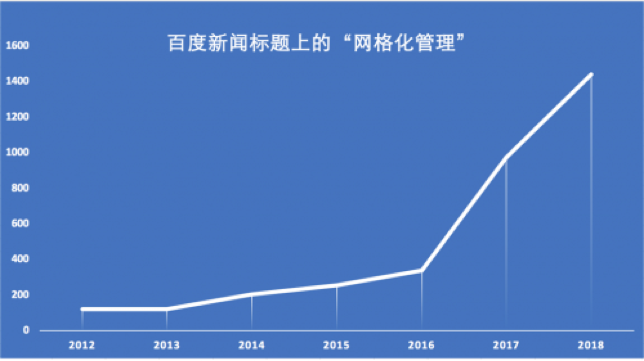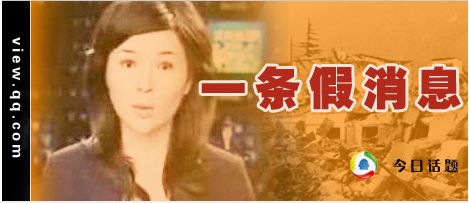
By David Bandurski — A lot has been written about China’s response to the May 12 earthquake as a test of the leadership’s commitment to openness. But the flood of quake-related news and information over the last few weeks has also tested the Chinese public’s commitment to the truth. [Frontpage Image: Screenshot of QQ.com coverage of policewoman Jiang Xiaojuan, one of several heroes of the Sichuan quake relief effort].
Chinese are increasingly savvy media consumers, and there is no doubting their growing appetite for information. It is probably safe to assume, too, that most Chinese share a basic expectation that the information they read is reliable. Don’t we all?
But when it comes to emotionally charged issues like the disastrous earthquake in Sichuan (or unrest in Tibet, or the Beijing Olympics), views about the relative importance of reliable information over more intangible things like national glory or motherly love can grow very contentious.
This became clear at QQ.com over the weekend, when a special topics page on the “tide of emotion” generated by one fake news story in particular drew hundreds of impassioned responses.
The fake story in question was about a mother who left an SMS text message for her baby as they were trapped in the rubble of the quake (“Sweet child, should you survive, you must remember that I love you.”) The widely discredited story first appeared in a Tianya chatroom and was subsequently reported by mainstream media without verification.

[Above: Screenshot of QQ.com feature page on the fake story that moved China to tears. The characters read: “A bit of fake news.”]
A number of the comments on the QQ feature page, clearly the minority, spoke out against fake news:
“As soon as I saw this I thought it was fake, because it was so much like a novel,” wrote a user from the city of Taiyuan. “We need news that is true.”
“News seeks the truth. Once news departs from the truth it loses all necessity. This information might be well-meant, but it reflects an awful trend toward exaggeration of the news,” said a user from Xi’an.
But the vast majority of respondents were indignant that QQ should turn the truth of this particular SMS message into an issue at all.
“There are always those few who just have to sing the opposite tune from the people, thinking this is the only way you can set yourself apart,” one user wrote, an apparent reference to the need to sing the party’s “main theme” (主旋律). “Get lost! Is there any point to you doing this!”
“Who can doubt a mother’s love,” wrote another Web user in a clearly emotional post trailed with a forest of exclamation points.
“It doesn’t matter whether this information is true or not. What matters is whether the feelings are true,” said yet another.
The problem of fake and exaggerated news underscores two important factors in Chinese society. The first is the legacy of state propaganda, which emphasizes emotion at the expense of reason; party leaders turn the public eye from critical issues of public interest with narratives of public, party, government and military heroism.
The second is growing commercialization, which has led media outfits to seek out stories that “attract eyeballs” but which is also plagued by lack of professionalism and, again, the legacy of state propaganda.
It is encouraging, however, that the question of fake versus factual news has become an important highlight of media coverage following the Sichuan quake.
Just two days after the quake, CMP noted an editorial by Tao Duanfang (陶短房) that urged media against the official news style, in which news stories focus narrowly on the deeds of government leaders:
At this time, of course people are willing to listen to this or that government office talking about what they have already or are planning to do for the disaster victims and the disaster area. But they want more to hear those affected speak for themselves and say what they need the world outside to do for them. At this time, the disaster area and the disaster victims are the only true main characters. Only by listening more to the voices of these characters, by looking at their images, can those of us thousands or tens of thousands of miles distant truly understand what we can do to help, and what we should do.
On May 15, CMP Director Qian Gang similarly emphasized the need to focus on facts and practical measures, and to tone down the party rhetoric:
Big words and empty speeches, gaudy, showy and useless old habits, documents that parade their achievements to those on top, posing and dramatizing for the camera lens . . . At this moment, let this all pass away! Science and expertise is what our brothers and sisters in need hope for most.
The debate has played out again and again in scores of editorials.
Just before the weekend, an editorial in the Yangtse Evening News voiced frustration and concern about the possible longer-term impacts of media exaggeration on public confidence.
The editorial, by Le Yi (乐毅), addressed another controversial bit of news, the story of Jiangyou City policewoman Jiang Xiaojuan (蒋晓娟), who is said to have breast-fed orphans of the Sichuan quake. Le’s editorial began:
At night, as I was watching a disaster relief benefit on television, the male anchor used the emotive strains of a poetic recitation as he introduced the story of the Jiangyou City policewoman Jiang Xiaojuan, who was charged with breast-feeding orphans in the Beichuan earthquake and has been called online the “most beautiful cop mom.” “She set her own six month-old son aside . . . ” [said the anchor] to raucous applause, and a flash of concern crossed my mind — are we going to create yet another “Liu Jigui”? Because I seem to remember that the earliest reports said that Jiang Xiaojuan put her son into the care of her relatives in the countryside, as the disaster situation was tense and she couldn’t shirk her responsibilities to the department. How is it that we now have her making such an unnatural action as “setting [her son] aside.”
The story of Liu Jigui, which the writer references above, was a bone of contention following the disastrous snowstorms that hit China earlier this year. After Liu, a simple farmer, helped 44 travelers stranded by the storms, state media painted him as a selfless hero and he made several very dramatized television appearances.
Le Yi continues, talking about the dangers of exaggerated and constantly embellished news:
Nevertheless, this sort of elevated reporting carries with it major risk. For one thing, if it is found that a report is manufactured, this can make people distrustful of all publicity-style reports, like the mouse that ruins the whole pot of soup. In addition, the unnatural details of these exaggerated reports can lead people to think something’s wrong.
When you put these two things together, they will often cause people to have serious feelings of doubt about the credibility of media, and this lack of confidence can ultimately lead them to lose confidence in the government. Just as in the recent scandal over the misuse of disaster relief tents, the local Youth League secretary in Mianzhu, Fan Xiaohua (范晓华), was verbally abused just because his name was similar to the ‘Fan Xiaohua’ (范小华) being tossed around in rumors. Even after the truth was out, many Web users stubbornly believed it was Fan Xiaohua who had maliciously misused tents and harmed others. Clearly, this lack of confidence owes in large part to the poor influence of this kind of Liu Jigui reporting style.
I sincerely hope that in reports about quake heroes after this disaster we can avoid the reappearance of “Liu Jigui.” Only truth can lead to confidence, and only confidence can make society full of strength.
[Posted by David Bandurski, June 9, 2008, 1:28am HK]
FURTHER READING:
For another great look at this issue, see Alice Poon’s translation of a Southern Weekend commentary by Xin Lijian.




















